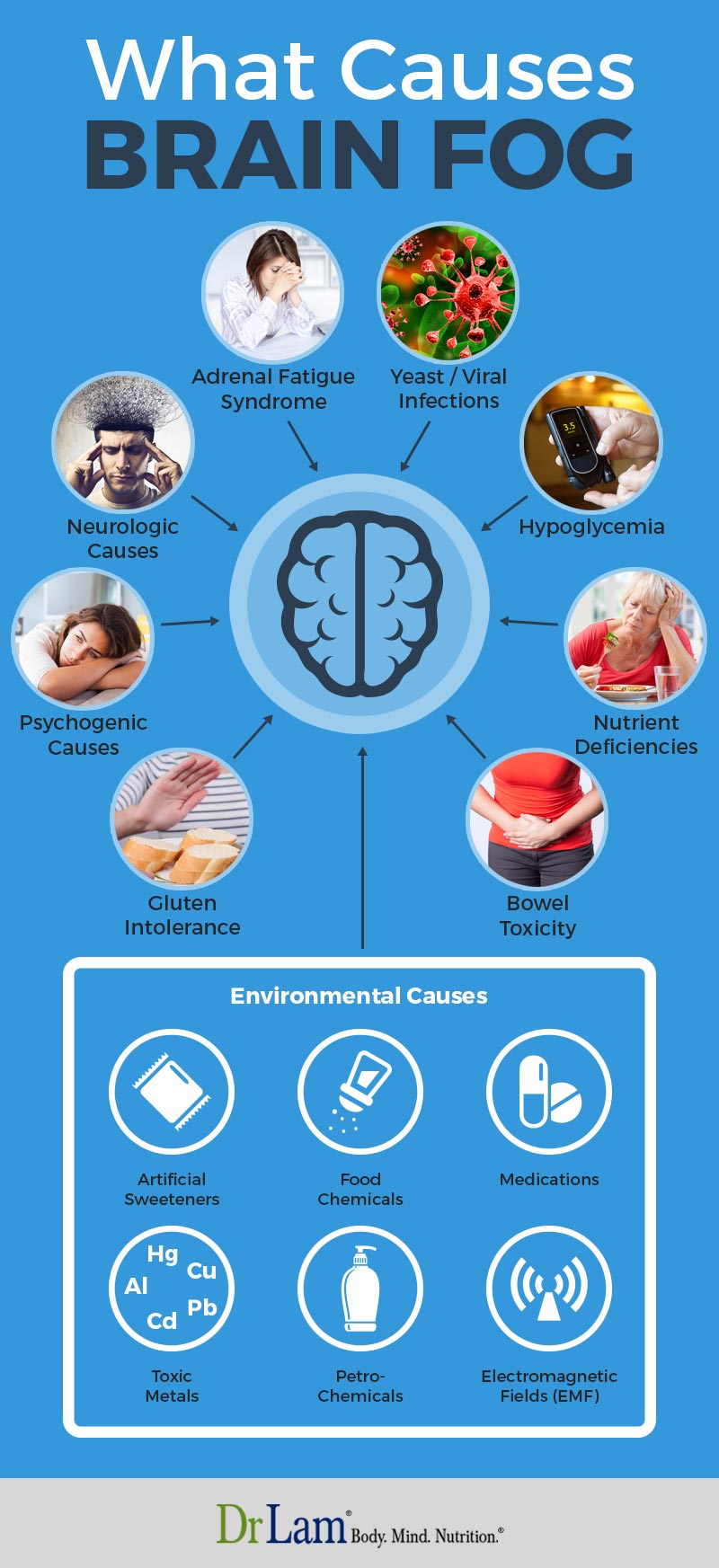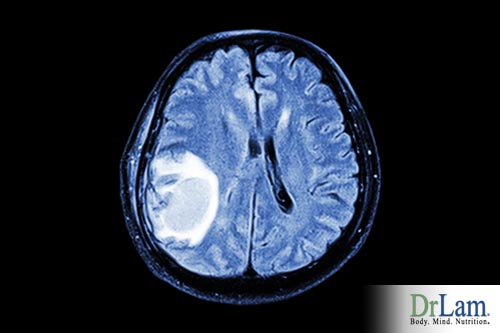
 The human brain serves as the control center of the neuroendocrine system. Subclinical brain dysfunctions can be extremely serious and cause a number of problems in our lives. One of the more common issues that people deal with every single day is brain fog. This is a condition where a person cannot think clearly about everyday matters. Though this is a prevalent condition, it is rarely recognized or discussed by health practitioners. You won’t find brain fog recognized as a bonafide illness in many medical or psychological writings.
The human brain serves as the control center of the neuroendocrine system. Subclinical brain dysfunctions can be extremely serious and cause a number of problems in our lives. One of the more common issues that people deal with every single day is brain fog. This is a condition where a person cannot think clearly about everyday matters. Though this is a prevalent condition, it is rarely recognized or discussed by health practitioners. You won’t find brain fog recognized as a bonafide illness in many medical or psychological writings.
The reason is simple – physicians are not taught of its significance in medical school. This under-education leads to tremendous confusion among the public and professionals alike between various memory loss conditions and their differentiation. Brain fog, because of its rather mild presentation, is ignored as a significant clinical condition.
This article will examine its many pathophysiological causes.
Brain Fog has been described as a feeling of mental confusion where the individual lacks mental clarity. Its as if there is a loss of focus, and a sensation of “so close and yet so far”. The term “fog” is used because it feels as if a cloud comes over your thought process that reduces your ability to think clearly. This may cause an individual to become excessively forgetful, though long term memory remains intact. It can last anywhere from a few hours to a few days or weeks. Its onset can be gradual or sudden. Usually, there is no direct physical trauma to the brain involved. Most people know something is wrong but cannot put their finger on it. Most don’t take it seriously and consider it part of life or the aging process. It is considered more of a nuisance among conventional health practitioners.
Brain fog can persist for a long time, lasting months or years. What makes this condition perplexing is that the fogginess can come and go. It can be related to food, menstrual cycle, body temperature, activity level, sleep cycle irregularity, stress, hydration status, exercise, and many other seemingly insignificant events that only become obvious on careful retrospective examination.
Severe brain fog can lead to inferior work performance among those whose career relies on a high degree of mental acuity. Severe chronic brain fog can ultimately lead to discouragement and depression.
To date, there are no specific medical tests to diagnose brain fog. Brain scans are normal. Diagnosis is best made by talking to your doctor about your symptoms. Though symptoms can vary from one person to another, most often sufferers complain of:
Your doctor may have a hard time getting to the bottom of your complaints and the constellation of symptoms can fit many ailments like dementia, Alzheimer’s Disease, or mental illness.
 There is no objective laboratory test to measure brain fog. It is a subjective clinical determination based on careful history and exclusion of medical illness that presents with similar symptoms. Generally, a sufferer has a normal physical examination but realizes that they do not function as well as they should mentally, but they don’t understand why. Most physicians would pass it off as an annoyance or “old age” of no significant clinical concern.
There is no objective laboratory test to measure brain fog. It is a subjective clinical determination based on careful history and exclusion of medical illness that presents with similar symptoms. Generally, a sufferer has a normal physical examination but realizes that they do not function as well as they should mentally, but they don’t understand why. Most physicians would pass it off as an annoyance or “old age” of no significant clinical concern.
Your mind may often seem foggy and your thought processes slow and cumbersome. Brain fog is not the same as Alzheimer’s or dementia. It is also much different than mental retardation, depression and other mental ailments. Since the condition comes on very gradual, sufferers are often prone to just deal with it and not look for causes and answers to their condition.
In the majority of cases, brain fog is brought on by nutritional, metabolic, hormonal, and biochemical imbalances that stem from a variety of factors. The neuroendocrine system is the primary conduit of memory function. Dysfunction of this system is the most common cause of brain fog.

Adrenal Fatigue Syndrome (AFS) is very common today. It reflects an imbalance of the body’s neuroendocrine system. Classic symptoms include fatigue, low libido, hypoglycemia, anxiety, brain fog, constipation, insomnia, heart palpitation, and depression. During AFS, the entire body slows down to conserve energy as a survival mechanism. As the liver slows down, metabolic clearance reduces while laboratory values continue to be normal. Internal accumulation of unwanted metabolites can travel to the brain, causing brain fog. This is very common.
Recovery usually requires a comprehensive program focused on the adrenal glands that include a nutritional diet, supplements, and lifestyle changes. A single focus on removing symptoms of brain fog alone in these settings usually fails and in fact, can worsen over time.
While AFS is frequently associated with brain fog, there are many other possible causation factors as well. We will look at these in more detail.
There are many other conditions that can be associated or act as a trigger of brain fog. We shall examine some of these now.
Candida albicans overgrowth can produce toxic substances like alcohol and acetaldehyde, which can poison the nervous system. This is often a contributing factor to brain fog.
An individual may feel like they are confused mentally, although they have consumed no alcohol. Symptoms can drastically worsen from eating too many carbohydrates, processed sugars, starches, and fats. Starchy foods and sugars feed yeast organisms, causing them to grow and invade other parts of the body. In extreme cases, the yeast infection can reach your brain.
During yeast die-off, individuals may experience brain fog and this is brought on by a dietary change, fasting, antibiotic therapy, or a dramatic lifestyle change. Any change in metabolism can cause yeast to die, releasing various toxins that can overwhelm the body. This condition is usually temporary, but you may experience brain fog during this time.
 Hypoglycemia, also known as low blood sugar, has been associated with brain fog. The glucose level in your brain can become very low, resulting in your brain starving for fuel. Our brain uses a large portion of the calories we consume orally. Your muscles have the ability to store fuel, but your brain does not. This means it must have a continual supply. Maintaining a normal blood sugar level in the brain is one of the key survival mechanisms of the body. When the brain’s fuel supply varies, all organ system functions are affected.
Hypoglycemia, also known as low blood sugar, has been associated with brain fog. The glucose level in your brain can become very low, resulting in your brain starving for fuel. Our brain uses a large portion of the calories we consume orally. Your muscles have the ability to store fuel, but your brain does not. This means it must have a continual supply. Maintaining a normal blood sugar level in the brain is one of the key survival mechanisms of the body. When the brain’s fuel supply varies, all organ system functions are affected.
Symptoms of low blood sugar often occur 2-3 hours after eating and include:
Laboratory tests of blood sugar will be low classically, but very few people fall into this category. Instead, most people will show normal blood sugar levels while symptoms of hypoglycemia are present. This type of hypoglycemia is called reactive hypoglycemia. It is classically seen in those with Adrenal Fatigue Syndrome.
You can get temporary relief by eating a candy bar or something sweet. The danger of eating sweets each time your blood sugar feels low is that it perpetuates candida albicans and worsen adrenal fatigue if the underlying issue is not properly addressed.
Putting the body on a roller-coaster ride of fuel input to prop up energy supply usually triggers brain fog and Adrenal Fatigue Syndrome over time.
Artificial sweeteners such as Nutrasweet have been shown to cause a number of conditions including brain fog. They can also cause depression, panic attacks, dizziness, fatigue and many other ailments. This substance can be found in thousands of products we all use every day. It is sometimes hidden in products like toothpaste, vitamins, medications, and breath mints. It can also be labeled as aspartame, Equal, Canderel, Spoonful, aspartic acid, phenylalanine, or neotame.
For those who are constitutionally sensitive, additives to foods, beverages, and other products can cause problems. These are known as excitotoxins. These substances can be added to drinking water, foods and common products we all use each day. One of the more common is MSG (monosodium glutamate). It is responsible for the Chinese Food Syndrome where people develop symptoms of anxiety, dizziness, or brain fog after eating foods from a Chinese restaurant that are universally laced with MSG.
There are a number of foods that often cause mild allergic reactions and may lead to brain fog. Not everyone will react to these foods but some people do show low tolerance to foods like spelt, wheat, soy and cow’s milk and other dairy products. If you believe you may be suffering with brain fog, then try eliminating them from your diet. More and more individuals are discovering that they are sensitive to gluten-containing foods like oats, rye, barley, wheat, corn, and spelt.
 Today, you’ll find a number of prescription and over-the-counter drugs that have ingredients that can cause brain fog or mental confusion. Those with sensitive systems should learn to read the labels and know what they are really taking. Even things like blood pressure medicine or heart medications or drugs for infections and glaucoma can contain irritating substances.
Today, you’ll find a number of prescription and over-the-counter drugs that have ingredients that can cause brain fog or mental confusion. Those with sensitive systems should learn to read the labels and know what they are really taking. Even things like blood pressure medicine or heart medications or drugs for infections and glaucoma can contain irritating substances.
Often, people take several of these drugs at the same time. It’s difficult to predict how a combination of drugs may affect a person, but it’s never recommended to use alcohol or recreational drugs when taking a heart or blood pressure medication.
All types of birth control pills, including the patch and IUD may cause brain fog for some individuals.
The human brain requires a number of nutrients in order to perform at optimum efficiency. These include proteins, high-quality fats and starches. Our brains also need minerals and vitamins. Some of the more important are zinc, magnesium, calcium, selenium, chromium, thiamine, iodine, L-taurine, choline, L-glutamine, B6, and B12. Omega 3 fatty acids and Vitamin D are also important for good brain health.
B-vitamin deficiencies can result in irritability, confusion, and lethargy. It is a mimic of Alzheimer’s Disease. Correcting this is very simple and inexpensive.
Viral infections affect the brain by excreting toxins into the bloodstream. This results in the depletion of certain nutrients essential to the brain. Viral titer may be normal, but a sensitive person can be affected. Such stealth viruses that can directly or indirectly affect the brain include Hepatitis C, Herpes, human papillomavirus, Epstein-Barr, and cytomegalovirus, among others. Infected teeth or gums can also release toxins. Lyme disease as well as H. Pylori infections also frequently trigger brain fog. Not to be forgotten is a chronic low-grade infection that may arise from poorly done dental root canal work.
Most fresh fish worldwide have some level of mercury. Pregnant women and children are usually advised to be cautious about the amount they consume. Those living near coastal regions are particularly vulnerable. Those who consume a diet that includes fish more than twice per week, may over time, build up a toxic level of mercury in their bodies. The EPA recommends that women, children and the elderly or those with health concerns avoid eating swordfish, shark, tilefish and king mackerel because they traditionally contain higher levels of mercury.
The EPA does recommend limiting your consumption of these fish to two meals per week. They also advise checking local authorities about the mercury levels in fish caught in area lakes and ponds before eating any freshly caught fish.
Another common source of overlooked mercury is dental fillings. A biological dentist is needed for proper removal in these cases if the body is ready. Overzealous removal of mercury fillings can trigger brain fog as mercury released from the oral cavity travels to the central nervous system.
Mercury is a neurotoxin. Excessive build up can lead to numerous neurological symptoms including memory loss, tingling, and brain fog, among others. Fortunately, mercury levels in the body can easily be tested by blood.
 Those with excessive levels of copper in their bloodstream may experience mood swings, confusion, or feelings of disorientation. Their thought process may be muddled or race in many directions. Women may notice that the condition worsens just before and during their menstrual period. This time of the month is usually marked by higher cellular activity which increases the blood level of copper.
Those with excessive levels of copper in their bloodstream may experience mood swings, confusion, or feelings of disorientation. Their thought process may be muddled or race in many directions. Women may notice that the condition worsens just before and during their menstrual period. This time of the month is usually marked by higher cellular activity which increases the blood level of copper.
Regular use of birth control pills or patches can worsen this problem. A copper imbalance can affect other areas as well, including your thyroid. Copper imbalances are normally difficult to diagnose. A doctor can administer special blood and urine tests to tell if you have high levels of copper.
Hair tissue mineral analysis can reveal high copper levels as well. If you’ve been experiencing consistent migraine headaches for years with no explainable cause, this can indicate high levels of copper.
Although not absolute, indicators that can infer the presence of high copper toxicity include high calcium, potassium, mercury, and zinc levels in the blood or hair tissue.
Copper imbalance can occur for many reasons. Some of these include vegetarian or semi-vegetarian diets, weak adrenal glands, stress, zinc deficiency, using birth control pills, fatigue, or copper intrauterine devices. Some areas also experience copper contamination in drinking water or food due to pollution.
Most vegetarian diets are low in zinc and high in copper. These diets are often low in other essential nutrients that are important for proper brain function. These include carnitine, taurine, B12, essential fatty acids, and others. Those who suspect they may have brain fog should avoid a vegetarian diet and see if brain fog resolves. Be sure to eat at least one portion of meat each day.
Brain fog can also be brought on by toxicity with other metals, such as aluminum, lead, cadmium or others. Aluminum is found in antacids, antiperspirants, soda-cans, and many cosmetics.
Common recommended metal detoxification modalities can include chelation, cleanses, enemas, flushes, saunas, hot soaks, massages, and others. Medications including EDTA and DMPS are used. IV Chelation is the most common and recognized way to reduce heavy metal in the body. Not everyone can tolerate or do well with chelation. It can cause a retoxification reaction among those who are weak or sensitive, such as those in advanced stages of Adrenal Fatigue or Chronic Fatigue Syndrome.
Even without an overload of heavy metals such as mercury, most people are exposed to some level of toxic petroleum distillates, also known as petrochemicals. They occur everywhere from the interior of your auto, such as the plastic dashboard and seat cushions to common plastic items found around the home such as shampoo and plastic bottles. Other less obvious items include products used on your lawn, inks, paints, and even insecticides used in growing our fruits and vegetables. Most city water supplies have various levels of toxic chemicals and these are usually monitored by your city water treatment facility. In larger cities, even the air is polluted as well.
 Many manufacturing plants also utilize processes that include chemicals and other harmful substances, in their manufacturing procedure. These can include cleaners and lubricants.
Many manufacturing plants also utilize processes that include chemicals and other harmful substances, in their manufacturing procedure. These can include cleaners and lubricants.
Over a number of years, these chemicals can build up in your body’s blood stream and major organs and become a dangerous issue. This is especially true when a person doesn’t eat right, get enough exercise or use nicotine products. These things weaken your body and make it difficult for your internal bodily functions to operate correctly. The bottom line is that your body stops filtering the harmful substances out on a regular basis and then a build-up begins internally. Because most metabolites are fat derived, they tend to be lipophilic. They like to stay in the brain which is also lipophilic because like compounds attract each other. Excessive lipophilic compounds in the brain, not cleared out of the circulation system, is a major contributing factor to brain fog.
Improperly digested foods can ferment or rot in the intestines. This, in turn, generates a number of powerful toxins. These substances will slowly poison your liver and other major organs critical in the detoxification process. They can also travel to the brain and cause a diminished capacity to think clearly.
Food ingested into the body needs to be processed and excreted out on a timely basis. This transit time is under 8 hours, but can take up to 20 hours or more if one is constipated. Once it goes past 20 hours, the foods in your intestinal system will start to rot releasing toxic substances into your bloodstream. When this process of assimilation and metabolization is slowed due to Adrenal Fatigue, toxic metabolites tend to build up internally.
Alarming signs of this include consistent constipation or slow bowel transit time. Enemas may be needed in severe cases to help bowel movement. The condition of slow bowel passage can be alleviated by using a good fiber product, enhancement of liver function, drink lots of water, and alkalization of the body. The diet should also be altered to include foods that are high in fiber and low in sugar and fat. Magnesium can be helpful as well.
Foods that contain gluten can cause unusual reactions in the brains of those with gluten sensitivities. Gluten is a protein found in many grains, including wheat, rye, and barley. Any type of food allergy can disrupt the sensitive balance of hormones and chemicals in our brains. The results can range from depression to schizophrenia.
Those sensitive to gluten may suffer from malabsorption and irritable bowel syndrome (IBS), which leads to low levels of essential nutrients in the body. In these cases, your body attacks the gluten as if it were an invader, and this will damage finger-like projections known as villi. These villi absorb nutrients as your food passes through the small intestine.
 Our brains require wholesome foods and water along with a variety of nutrients to be completely healthy. Some of the required vitamins and minerals include calcium, B12 and B6, zinc, selenium, iodine, and vitamin D.
Our brains require wholesome foods and water along with a variety of nutrients to be completely healthy. Some of the required vitamins and minerals include calcium, B12 and B6, zinc, selenium, iodine, and vitamin D.
These nutrients can be found in a wide range of foods, but they may not be digested properly if you are gluten sensitive. This makes it important to find out if you are gluten-sensitive and eliminate these foods from your diet. You will quickly notice an improvement in your mood, learning skills, digestion, and other areas.
Everyone is different and some people are more susceptible to electrical and electromagnetic fields. Though they can be quite harmless to some, they may adversely affect others. They can disrupt sleep patterns and cause a decline in your overall performance at work or school. This type of brain fog can have its source from sitting in front of a computer screen for long periods or excessive use of cell phones. Those who live near cell phone towers, electric plants, or radio towers can also be affected. These objects emit invisible rays of sound and energy that can cause certain sensitive people to feel upset or distressed.
It’s a good idea to turn off all televisions, computers, radios and other electrical devices well before and while sleeping. If possible keep electronic devices at least 10 feet away from your brain while sleeping. Unplug all electronic devices when not in use.
In some cases, brain fog can be caused by mental and emotional conflict or serious trauma. For instance, if you’ve been in a severe family conflict or accident where you or someone you love were injured, then you might continue to experience a condition similar to post-traumatic stress disorder (PTSD) for some months afterward.
You feel disconnected like you can’t think clearly about ordinary things. In cases like this, the individual uses brain fog as a way to deny reality. This can occur when your life isn’t going well. Perhaps you are going through a divorce or bankruptcy and your stress level is very high each day. Our bodies and brains find ways to deal with these adverse situations.
If the situation doesn’t improve, it may warrant speaking to a licensed therapist or psychologist. Sometimes we all need help to get through particularly harsh circumstances.
Misalignment of the spine can cause headaches and backaches. These can be hereditary or caused by trauma such as an accident. When the cranial or cervical nerves are pinched or out of alignment, this may not only cause pain, but it can also contribute to brain fog. Cranial-sacral therapy and chiropractic manipulation may be helpful in these cases.
 Reduced oxygen to the brain is another culprit and this can be due to simply not taking good deep breaths and filling your lungs with fresh air each day. Too many of us sit in stuffy offices and never get outside to take deep breaths and enjoy the sunshine. Reduced oxygen can also be caused by clogged arteries or low blood pressure. Certain diseases such as chronic bronchitis, COPD, asthma, or emphysema will impair breathing. Always make sure your upper airways are in good condition as the nasal passage is connected and part of the overall respiratory system.
Reduced oxygen to the brain is another culprit and this can be due to simply not taking good deep breaths and filling your lungs with fresh air each day. Too many of us sit in stuffy offices and never get outside to take deep breaths and enjoy the sunshine. Reduced oxygen can also be caused by clogged arteries or low blood pressure. Certain diseases such as chronic bronchitis, COPD, asthma, or emphysema will impair breathing. Always make sure your upper airways are in good condition as the nasal passage is connected and part of the overall respiratory system.
There are a few other illnesses and ailments that can, in rare cases, cause brain fog. These include but are not limited to brain tumors, meningitis, epilepsy, or encephalitis. Some vision problems may be a contributing factor, along with dyslexia and autism. The mental confusion that goes along with dyslexia, autism and ADD often results in brain fog. Fortunately, these are quite rare.
Electrolyte imbalances due to excessive sweating during exercise or physical labor will sometimes cause temporary brain fog. When the sodium level in the body is low, thinking is affected. It’s always a good idea to stay hydrated especially during the summer months with salt replenishment as needed.
Because brain fog is a sign of underlying dysfunction, the most important correction step must start with a physician who is alert to all the possible symptoms and pays close attention to your history.
Laboratory tests are generally not very helpful and can, in fact, be confusing to interpret. Marginal abnormalities are common. Proper clinical correlation is an absolute must. Otherwise it is easy to get carried away trying to treat the laboratory numbers rather than the person. Remember always that not every single laboratory abnormality needs to be corrected, and aggressive correctional protocol can generate unwanted side effects, which can make the overall condition worse. Those who are in advanced stages of Adrenal Fatigue Syndrome are particularly vulnerable due to the prevalence of paradoxical reactions that can surface.
Aggressive detoxification therapies commonly deployed for brain fog include enemas, cleanses, flushes, infrared sauna, acupuncture, reflexology, deep tissue massage, nutritional supplementation, herbs, chelation, and intensive chiropractic therapy. Fasting is also very popular. These can be considered for those in good health and constitutionally strong when properly conducted under supervision. Those who are weak or sensitive can get worse with any of these programs quickly. Self-navigation with these short term approaches is not recommended. A longer-term comprehensive program done professionally is usually needed for permanent results.
 In a setting of advanced adrenal fatigue, short term approaches to fix the brain fog often will backfire unless the adrenals are well healed. Proper timing is key. Those in advanced stages of Adrenal Fatigue Syndrome will do much better by focusing on the root cause first and making sure that a nutritional reserve is built prior to attempting any detoxification procedure to avoid triggering adrenal crashes. This is a much safer and more effective long term strategy.
In a setting of advanced adrenal fatigue, short term approaches to fix the brain fog often will backfire unless the adrenals are well healed. Proper timing is key. Those in advanced stages of Adrenal Fatigue Syndrome will do much better by focusing on the root cause first and making sure that a nutritional reserve is built prior to attempting any detoxification procedure to avoid triggering adrenal crashes. This is a much safer and more effective long term strategy.
We do see many cases of brain fog that spontaneously resolve once adrenal dysfunction is repaired properly and naturally without the use of stimulants. Patience is required. Most are pleasantly surprised on how fast the body can respond if the proper adrenal recovery program is instituted. In Dr. Lam's Adrenal Fatigue Recovery Program, you'll learn about your stage of adrenal fatigue, how to use the supplements, which foods to eat, the exercises that benefit you, and much more. This course is about helping you make informed choices and avoiding the pitfalls Dr. Lam faced in his recovery journey.
Brain fog may be a result of a long term build up of toxins. Firstly, look at your diet to eliminate things that can cause more harm such as sugar, caffeine, alcohol. Your lifestyle (stress, continuous late night activities, lack of sleep, etc.) may also affect your AFS.